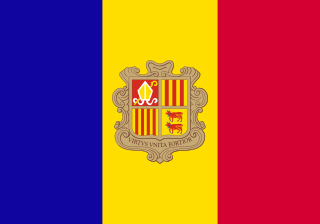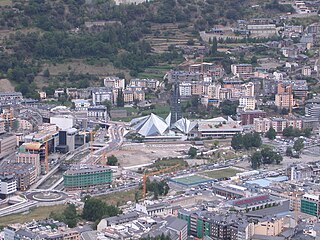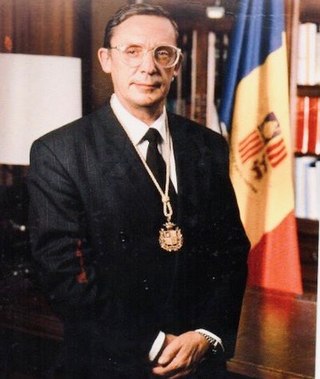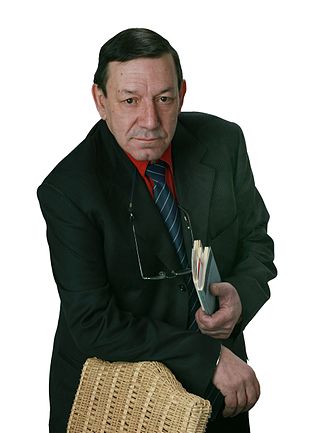Contents
| |||||
| Decades: | |||||
|---|---|---|---|---|---|
| See also: | |||||
Events in the year 2021 in Andorra .
| |||||
| Decades: | |||||
|---|---|---|---|---|---|
| See also: | |||||
Events in the year 2021 in Andorra .
Ongoing — COVID-19 pandemic in Andorra

Andorra, officially the Principality of Andorra, is a sovereign landlocked country on the Iberian Peninsula, in the eastern Pyrenees, bordered by France to the north and Spain to the south. Believed to have been created by Charlemagne, Andorra was ruled by the count of Urgell until 988, when it was transferred to the Roman Catholic Diocese of Urgell. The present principality was formed by a charter in 1278. It is currently headed by two co-princes: the bishop of Urgell in Catalonia, Spain and the president of France. Its capital and largest city is Andorra la Vella.
Andorra, officially the Principality of Andorra, also called the Principality of the Valleys of Andorra, is a sovereign landlocked microstate in southwestern Europe, located in the eastern Pyrenees mountain range and is bordered by Spain and France.

Escaldes–Engordany is one of the seven parishes of Andorra. The Escaldes–Engordany parish was founded on 14 June 1978 and has the second largest population after Andorra la Vella. The parish is composed of the areas les Escaldes, Engordany, Els Vilars d'Engordany, Engolasters, and El Fener. As of 2014 it has a population of 13,634. Notable events include the town's annual jazz festival. It borders four parishes: Encamp to the north and northeast, Sant Julià de Lòria in the southwest, Andorra la Vella in the west, and La Massana in the northwest. Escaldes–Engordany also borders Spain in the east, south and southeast.
Andorra participated in the Eurovision Song Contest 2006 with the song "Sense tu" written by Rafael Artesero and Joan Antoni Rechi. The song was performed by Jenny, who was internally selected by the Andorran broadcaster Ràdio i Televisió d'Andorra (RTVA) to represent Andorra at the 2006 contest in Athens, Greece. The song, "Sense tu", was presented to the public on 8 March 2006 during a special gala show entitled Alguna cosa batega.

Antoni "Toni" Lima Solà is a retired professional footballer who played as a central defender.

Òscar Ribas Reig was an Andorran politician, lawyer, and businessman who became the prime minister of Andorra in 1982. He twice served as head of government, first from 8 January 1982 to 21 May 1984 and again from 12 January 1990 to 7 December 1994.

Antoni Martí Petit was an Andorran architect and politician who served as the prime minister of Andorra between 2011 and 2019, when he was elected on the ticket of the Democrats for Andorra.

Felícia Fuster i Viladecans was a Spanish painter, poet and translator. Born in Barcelona, she moved to Paris in 1951. She was finalist for the Premi Carles Riba in 1984 and Premi Màrius Torres in 1997, and she won the Premi Vicent Andrés Estellés in 1987.

Antoni Morell Mora was a Spanish-born Andorran diplomat, civil servant, writer and lawyer.

Maria Rosa Ferrer ObiolsGOIH LH, was an Andorran lawyer and politician. She was the Cònsol Major of the Comú d'Andorra la Vella from 2007 until 2015 and the Minister of Health, Welfare and Employment of the Principality of Andorra until 4 January 2016.

Xavier Espot Zamora is an Andorran judge and politician. He is a former minister of justice and the current prime minister of Andorra, serving since 16 May 2019.
Meritxell Palmitjavila Naudí is an Andorran politician, current Deputy General Syndic of the General Council of Andorra since 3 May 2019, she is the Deputy Speaker of the Parliament of Andorra.
Events in the year 2020 in the Principality of Andorra.
Joan Armengol i Pal was an Andorran attorney and politician; he also served as Mayor of Andorra la Vella between 1970 and 1971. During his term, he oversaw the population growth and the modernization of the city and was president of the local elections of 1971, the first in which women could vote.
Antoni Puigdellívol i Riberaygua was an Andorran businessman and politician.
Climent Palmitjavila i Torres was an Andorran politician.
Elidà Amigó i Montanya was an Andorran historian, archivist, activist, and suffragist. A leader in the feminist movement that led to Andorran women gaining the right to vote in 1970, she was also an academic expert on the history and sociology of the microstate of Andorra. She has been described as "the first Andorran intellectual to bring critical awareness to the condition of women" in the principality.
Susagna Arasanz i Serra was an Andorran economist and politician, minister of finance between 1994 and 2000, becoming the first woman to hold the office, under the premiership of Marc Forné.
The literature of Andorra is part of Catalan literature, that is, of literature in the Catalan language. It is the literature represented by the writings created in the Principality of Andorra or by Andorran authors.